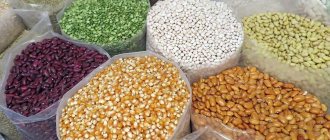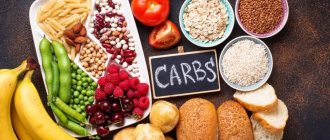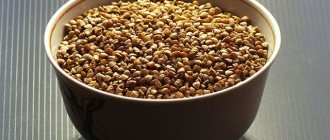This article was prepared by our beloved partners - the #GMfood - an online store of superfoods and craft eco-products.
Just for registering in the store you will receive 300 rubles to your personal bonus account and 2 more interesting gifts (Grab your gifts here)In the store's assortment you will find not only superfoods, but also healthy sweets, breakfasts, herbal teas, peanut butter, master classes for body health and facial beauty, and this is only a small part of the goodies and benefits!
Subscribe to Instagram #GMfood using this link and regularly receive new PP recipes with superfoods, see useful guides to the world of proper nutrition, and also look for gifts hidden under the link in the profile!
Functions of carbohydrates in the body
Carbohydrates are the main fuel that provides energy for all processes occurring in the human body.
Their main functions are:
- Maintaining the tone of body tissues;
- Filling the body and brain with energy;
- Stimulating the absorption of fats;
- Protecting the body from bacterial growth;
- Normalization of intestinal function.
They are necessary to maintain the health of the body as a whole, including strengthening the immune system and reducing the risk of colds. But everything is good in moderation. Therefore, in order to avoid the occurrence of various diseases, they should be consumed in reasonable quantities.
Here's what the poem says about carbohydrates:
A little chemistry
Any carbohydrate molecule consists of atoms C, H and O. The most abundant is hydrogen, since it is considered the simplest element of all existing ones. In second place in quantity is carbon, and in third place is oxygen. It is carbon that is the basic element and it is it that forms chains, which can be branched or unbranched. The more complex a molecule is, the more energy it provides (except for indigestible carbohydrates).
All carbohydrates that a person consumes are divided into simple and complex. The division is mainly based on morphological differences. However, when the morphology changes, the taste and biochemical properties also change. The simpler the structure, the sweeter the taste and easier digestibility. The most complex carbohydrates and fiber do not decompose at all and are excreted unchanged from the human body.
What are carbohydrates
Carbohydrates are natural organic substances containing carbon and water.
Carbohydrates are an integral component of the cells and tissues of all living organisms, representatives of the plant and animal world, constituting (by weight) the bulk of the organic matter on Earth. The source of carbohydrates for all living organisms is the process of photosynthesis carried out by plants.
Source Wikipedia
The main part of them enters the body with food. They serve as the main source of energy for the body, ensure the functioning of the brain, heart and liver, give strength to perform physical exercises, and normalize the functioning of the nervous and muscular systems.
Polysaccharides
All complex carbohydrates can be divided into those that are digestible and those that are not digestible and are not a source of energy, but perform equally important functions in the digestive processes.
As digestible carbohydrates, starch and glycogen can be distinguished. All of them are high molecular weight compounds. The number of their monomers can reach hundreds and even thousands. This complex morphology causes long-term digestion. Polysaccharides can be divided into homopolysaccharides and heteropolysaccharides. The difference is that for some the monomer is one substance, while for others it is different.
Starch
Mainly found in plants in all parts (bulbs, tubers, seeds). Belong to reserve polysaccharides.
Glycogen
It is the main and main source of energy in the human body. If necessary, glycogen is converted into glucose to replenish the deficiency.
Indigestible carbohydrates
Indigestible carbohydrates include fiber and pectin. They are polysaccharides, but due to their complex structure they cannot be broken down by digestive enzymes. Their role in energy metabolism is small. When this type of carbohydrate breaks down, a very small amount of energy is released, which is not even taken into account.
They are not broken down by enzymes of the stomach and intestines and are excreted almost unchanged from the body through the gastrointestinal tract. Indigestible carbohydrates can retain water in the body, affect intestinal motility and promote the formation of bile for better digestion.
What are they needed for
In order to feel good, you need to eat right. The diet should contain proteins, fats and carbohydrates. If one of them is not enough, a person feels tired, uncomfortable and unwell.
The source of energy is carbohydrates. But you need to know how much you should consume per day so as not to harm your health.
They are divided into 2 groups: simple and complex.
Simple
Simple carbohydrates include: glucose, fructose, galactose. These substances are quickly absorbed in the intestines and sharply increase blood sugar levels. And this leads to a sharp release of insulin by the pancreas.
It is necessary to minimize the consumption of sugar, sweets, cookies, cakes, pastries, honey.
Simple carbohydrates give you a feeling of slight satiety, but not for long. After some time you feel hungry. They are found in white baked goods, grapes, bananas, sweets, corn, and confectionery.
Complex
Complex carbohydrates include: starch, fiber, pectins, glycogen.
Many nutritionists recommend creating a menu in such a way that it consists of 60% carbohydrates. Complex carbohydrates, together with proteins, carry out the synthesis of hormones and enzymes, which is important for the functioning of the body.
Dietary fiber is important for digestion. Thanks to them, intestinal function is normalized and digestion is improved.
Complex carbohydrates make you feel full for a long time. They are found in vegetables, potatoes, cereals, and pasta.
Fiber or dietary fiber is not digested, but leaves the body naturally. It cleanses the intestines and removes toxins and waste from the body. Fiber is found in vegetables, bran, and greens.
Hypoglycemia and hyperglycemia, what is it?
If a person does not have problems with the pancreas, which causes disruption of hormone synthesis, then the symptoms of hyperglycemia do not appear.
It’s a different matter if this condition is chronic and is caused by the fact that insulin does not have time to convert excess glucose into glycogen. Then three main symptoms appear that should alert a person:
- Polyuria is an increased amount of urine and urination.
- Polyphagia - a person eats often and a lot because the cell cannot receive glucose.
- Polydipsia - a person often drinks a lot due to dry mouth and thirst caused by changes in the osmotic composition of the blood.
These are direct indications for a visit to a therapist or endocrinologist.
Another thing is hypoglycemia, a condition in which there is a lack of glucose in the peripheral blood. The cells do not receive the required amount of energy material and therefore the entire body suffers. Other reasons include:
- Fluid deficiency.
- Abuse of refined carbohydrates.
- Using insulin or another glucose-lowering drug in excess of the required dose.
- Wrong number of meals when treating diabetes.
- Heavy physical activity.
- Systematic alcohol consumption.
- Hunger.
- Malignant and benign neoplasms of the pancreas.
Hypoglycemia syndrome manifests itself in different ways, depending on the severity. Symptoms include:
- hand tremors and unsteadiness of gait;
- feeling of hunger, thirst;
- nausea and general weakness;
- increased excitability or, on the contrary, inhibition;
- increased sweating, arrhythmia;
- in severe cases, coma and profound neurological impairment.
What does their excess amount in the body lead to?
Excess carbohydrates lead to increased blood sugar and subsequently diabetes. In addition, impaired carbohydrate metabolism can lead to the development of various diseases:
- Coronary heart disease;
- Increased blood pressure;
- Polycystic ovary syndrome, manifested by increased hair growth, acne, oily skin;
- Slowing the excretion of uric acid by the kidneys contributes to its accumulation, and subsequently to the development of gout.
Why consider the glycemic index of foods
For an adult, a normal blood glucose level is considered to be between 4.1 and 5.9 mmol/l (depending on the laboratory, the upper and lower limits may differ slightly from those indicated). An indicator such as the glycemic index of foods affects blood glucose levels. It is carbohydrates that lower or increase “sugar” in the body. It is necessary to take into account the GI of foods if you want to lose weight or have health problems such as insulin resistance and diabetes. The higher the glycemic index, the faster carbohydrates are digested. And, accordingly, the level of glucose in the blood will increase. For this reason, preference should be given to slow carbohydrates, and fast carbohydrates should be limited or removed from the diet. From the table below it is clear that there is no relationship between the energy value of foods and GI. Thus, food may not be sweet at all, but have a high glycemic index.
| Product (100 g) | Glycemic index | Calorie content, kcal |
| Slow carbohydrates | ||
| Brown rice | 45 | 111 |
| Chickpeas | 30 | 364 |
| Fast carbohydrates | ||
| Semolina | 80 | 369 |
| White rice | 70 | 130 |
How many carbohydrates do you need per day when losing weight?
A carbohydrate diet is effective for weight loss. I talked about this in the article Carbohydrate diet for weight loss. Menu for weight loss.”
According to the recommendations of nutritionists, the daily intake of carbohydrates for an ordinary person should be 45-65% of the total calorie content of food. So, with an estimated caloric intake of 2000 kcal, their share should be 225-325 grams.
Typically, a low-carb diet refers to a diet that consumes less than 200 grams of carbohydrates per day. To start the weight loss process, the optimal amount is considered to be up to 100 g per day.
The optimal amount for each person is individual and is determined taking into account age, gender, and physical activity.
In order to lose weight, you need to create a calorie deficit, that is, eat less than you burn during the day. Those who want to lose weight need to maintain the correct balance of BJU.
To lose weight:
- Protein should make up > 18% of the diet;
- Fat < 26%;
- Carbohydrates < 56%.
When losing weight, complex carbohydrates should be the basis of your diet. This:
- Cereals: oatmeal, buckwheat, millet, bulgur, pearl barley, brown rice;
- Pasta from durum wheat;
- Legumes: peas, beans, lentils;
- Raw vegetables, because they are digested more slowly than boiled ones;
- Fruits;
- Berries;
- Nuts;
- Pumpkin and sunflower seeds.
But don’t forget that you need to eat within reasonable limits, often and in small portions.
When and how best to consume carbohydrates.
During physical activity you cannot do without carbohydrates. It is very important to know the body's daily requirement for carbohydrates. It depends on a person's energy expenditure. On average, this norm ranges from 300-800 g per day. The more intense the physical work, the more carbohydrates the body needs.
During a workout lasting about 1 hour, the need for carbohydrates is about 4-5 g per 1 kg. weight. If the workout lasts about 1.5-2 hours, the need increases by another 1 g, and with prolonged exercise (4 hours or more), the body needs 7-8 g of carbohydrates per 1 kg. body weight.
As already noted, the body stores carbohydrates in the form of glycogen, which is stored in the muscles and liver. During physical activity, such reserves are consumed within 2–3 hours, but have a slow recovery rate. The important factors here are the timing of carbohydrate intake and their type. If you take a portion of carbohydrates immediately after a hard workout, and then every 2.5 hours, your glycogen reserve will be restored faster. Complete restoration of glycogen reserves is observed after a 20-hour period. When consuming foods with a high GI, the restoration of glycogen reserves in the muscles occurs much faster, but the athlete’s somatotype plays a decisive role here.
To gain muscle mass, 3-4 g of carbohydrates per 1 g of body weight will be sufficient (but you need to take into account individual characteristics: for example, ectomorphs can have 4 g of carbohydrates per 1 kg of body weight, and endomorphs need to look at their current weight and amount subcutaneous, visceral fat). You need to add carbohydrates only when, under optimally selected conditions (diet, sleep, training and rest), muscle mass does not grow. The last intake of carbohydrates (complex) should be taken no later than 18 pm. This also applies to rest days.
When losing weight and building muscle definition, women need to reduce their carbohydrate intake to 1.5 g per 1 kg. body weight, and for men - up to 2 g, both on training days and during the rest period. At this stage, you should only consume complex carbohydrates, and before lunch, during snacks, give preference to fruits.
What foods contain carbohydrates
Simple carbohydrates contain:
- In sugar;
- Starchy vegetables;
- Peanuts and chestnuts;
- Sweet fruits: grapes, dates, figs, bananas, persimmons, watermelons;
- Dried fruits: raisins, prunes, apricots;
- Sweet baked goods;
- Chocolate.
They are also found in small quantities in dairy products. They are also valuable for their high protein content.
When losing weight you should exclude from your diet:
- Bakery and pasta products;
- Honey;
- Ice cream;
- Chips, kirieshki, crackers;
- Confectionery, cakes, pastries, cookies, sweets;
- Canned food;
- Semi-finished products;
- Sausages;
- Beer.
What are the dangers of excess carbohydrates?
The first “bonus” that a person will receive if he is addicted to carbohydrates is excess weight.
The second risk is an increase in insulin, which overloads the pancreas. As a result, cell depletion occurs and the risk of developing diabetes mellitus increases significantly. If we talk about complex carbohydrates, then with a large amount of them in the body, the processes of food digestion stagnate and fermentation begins. Hence the discomfort and bloating. There is a risk that the body will be poisoned due to the intestines being “clogged” with toxins. Doctors call this fermentative dyspepsia.
People's reviews about the low-carbohydrate diet
What do real people say about a no-carb diet?
Feedback on the forum
Feedback on the forum
Feedback on the forum
Feedback on the forum
Feedback on the forum
Feedback on the forum
There are a lot of reviews, and mostly they are all positive.
// Useful and harmful products
The most beneficial for health are complex carbohydrates from vegetables and other plants that have undergone moderate heat treatment. Then there are various grains, whole grains and fruits, which contain a lot of dietary fiber and have a medium glycemic index.
Grains that are completely dehulled (for example, white rice, white flour and various products made from them) are sources of pure starch and are harmful for those wishing to lose weight. Eating brown rice is usually healthier than white rice due to the presence of fiber.
| // Harmful carbohydrates | // Healthy carbohydrates |
| White (polished) rice | Brown rice |
| Fruit juices | Vegetables and low-carb fruits |
| White bread | Whole wheat bread |
| Mashed potatoes | Buckwheat, quinoa |
| Cornflakes | Oatmeal |
What do you need to know about high-carb diets?
An increased percentage of carbohydrates in your diet will help positively impact your endurance and performance in your workouts, especially aerobic exercise (running, swimming, cycling), because the more carbohydrates you eat, the more glucose your body will store as muscle glycogen. The more glycogen it stores, the more energy you will have for your next workout.
For an optimal workout, it's the number of carbohydrates you eat (in grams) that matters, not the percentage of calories your body gets from them. Use this guide to calculate the recommended grams of carbohydrates you need in your daily diet.











